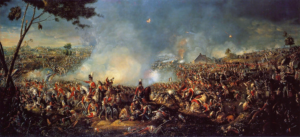
1815
The Battle of Waterloo
For twenty years, Napoleon Bonaparte, a minor Corsican noble who had made himself Emperor of the French, had troubled Europe with his armies and insane ambitions. Millions had died in the battles that raged from the Caribbean to the ruins of Moscow, but in 1814 Napoleon had found himself facing a great coalition that had brought him to admit defeat. Instead of taking him behind the woodshed and shooting him, thus ridding the world of such a pest, the crowned heads of Europe decided that it would not do to execute someone who had worn an emperor’s crown, an act that might give the lower orders dangerous ideas. So, a ridiculous fiction was devised, whereby Napoleon would continue his life as a ruler, but his domain would be restricted to the tiny island of Elba, off the west coast of Italy. He was given the freedom of his territory but a British squadron patrolled the island’s shores to prevent his escaping.
But escape he did. A small boat took him to France where the armies that had been sent to arrest him fell under his spell and reinstated him in imperial splendour in Paris. Poor Louis XVIII, whose Bourbon dynasty had been restored, fled quickly to England. For 100 days Napoleon ruled again and gathered a force to smash the coalition, marching north into Belgium to encounter a British army stationed there, before it could be joined by a Prussian contingent.
The leader of the British was Arthur Wellesley, the Duke of Wellington, who had a splendid career fighting in India and driving the French out of Portugal and Spain. Napoleon derided him as a “sepoy general” but he had beaten every French marshal that Bonaparte had sent against him. The two sides met at Waterloo, south of Brussels, and fought a bloody battle all day. Napoleon’s artillery hammered the British across a valley and senseless cavalry charges by both sides proved that mounted units were the best-looking but stupidest troops on the field. When, in the evening, German reinforcements arrived and the massed fire of British rifles drove back uphill charges by Napoleon’s elite Imperial Guard, the battle was lost. Shouts of “La Garde recule. Sauve qui peut!” (“The Guard retreats. Save yourself if you can!”) prompted a retreat. Napoleon abdicated his throne and surrendered to the British on July 15, 1815.